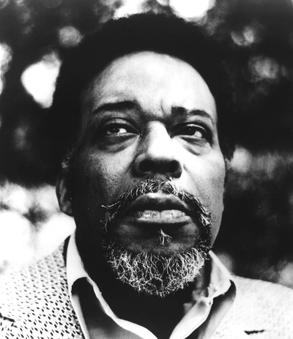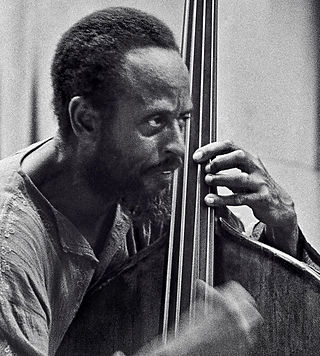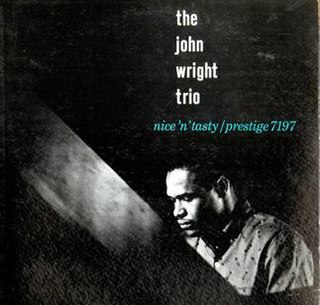Related Research Articles

Eric Allan Dolphy Jr. was an American jazz multi-instrumentalist and bandleader. Primarily an alto saxophonist, bass clarinetist, and flautist, Dolphy was one of several multi-instrumentalists to gain prominence during the same era. His use of the bass clarinet helped to establish the unconventional instrument within jazz. Dolphy extended the vocabulary and boundaries of the alto saxophone, and was among the earliest significant jazz flute soloists.

Coleman Randolph Hawkins, nicknamed "Hawk" and sometimes "Bean", was an American jazz tenor saxophonist. One of the first prominent jazz musicians on his instrument, as Joachim E. Berendt explained: "there were some tenor players before him, but the instrument was not an acknowledged jazz horn". Hawkins biographer John Chilton described the prevalent styles of tenor saxophone solos prior to Hawkins as "mooing" and "rubbery belches". Hawkins denied being first and noted his contemporaries Happy Caldwell, Stump Evans, and Prince Robinson, although he was the first to tailor his method of improvisation to the saxophone rather than imitate the techniques of the clarinet. Hawkins' virtuosic, arpeggiated approach to improvisation, with his characteristic rich, emotional, and vibrato-laden tonal style, was the main influence on a generation of tenor players that included Chu Berry, Charlie Barnet, Tex Beneke, Ben Webster, Vido Musso, Herschel Evans, Buddy Tate, and Don Byas, and through them the later tenormen, Arnett Cobb, Illinois Jacquet, Flip Phillips, Ike Quebec, Al Sears, Paul Gonsalves, and Lucky Thompson. While Hawkins became known with swing music during the big band era, he had a role in the development of bebop in the 1940s.
Leo Wright was an American jazz musician who played alto saxophone, flute and clarinet. He played with Booker Ervin, Charles Mingus, John Hardee, Kenny Burrell, Johnny Coles, Blue Mitchell and Dizzy Gillespie in the late 1950s, early 1960s and in the late 1970s. Relocating to Europe in 1963, Wright settled in Berlin and later Vienna. During this time he performed and recorded primarily in Europe, using European musicians or fellow American expatriates, such as Kenny Clarke and Art Farmer. He died of a heart attack in 1991 at the age of 57.

Eugene "Jug" Ammons, also known as "The Boss", was an American jazz tenor saxophonist. The son of boogie-woogie pianist Albert Ammons, Gene Ammons is remembered for his accessible music, steeped in soul and R&B.

Percy Heath was an American jazz bassist, brother of saxophonist Jimmy Heath and drummer Albert Heath, with whom he formed the Heath Brothers in 1975. Heath played with the Modern Jazz Quartet throughout their long history and also worked with Miles Davis, Dizzy Gillespie, Charlie Parker, Wes Montgomery, Thelonious Monk and Lee Konitz.

Sonny Stitt was an American jazz saxophonist of the bebop/hard bop idiom. Known for his warm tone, he was one of the best-documented saxophonists of his generation, recording more than 100 albums. He was nicknamed the "Lone Wolf" by jazz critic Dan Morgenstern because of his tendency to rarely work with the same musicians for long despite his relentless touring and devotion to the craft. Stitt was sometimes viewed as a Charlie Parker mimic, especially earlier in his career, but gradually came to develop his own sound and style, particularly when performing on tenor saxophone and even occasionally baritone saxophone.

Eddie Harris was an American jazz musician, best known for playing tenor saxophone and for introducing the electrically amplified saxophone. He was also fluent on the electric piano and organ. His best-known compositions are "Freedom Jazz Dance", popularized by Miles Davis in 1966, and "Listen Here".

John Arnold Griffin III was an American jazz tenor saxophonist. Nicknamed "the Little Giant" for his short stature and forceful playing, Griffin's career began in the mid-1940s and continued until the month of his death. A pioneering figure in hard bop, Griffin recorded prolifically as a bandleader in addition to stints with pianist Thelonious Monk, drummer Art Blakey, in partnership with fellow tenor Eddie "Lockjaw" Davis and as a member of the Kenny Clarke/Francy Boland Big Band after he moved to Europe in the 1960s. In 1995, Griffin was awarded an Honorary Doctorate of Music from Berklee College of Music.

Armando Peraza was a Cuban Latin jazz percussionist and a member of the rock band Santana. Peraza played congas, bongos, and timbales.

Clifford Laconia Jordan was an American jazz tenor saxophone player. While in Chicago, he performed with Max Roach, Sonny Stitt, and some rhythm and blues groups. He moved to New York City in 1957, after which he recorded three albums for Blue Note. He recorded with Horace Silver, J.J. Johnson, and Kenny Dorham, among others. He was part of the Charles Mingus Sextet, with Eric Dolphy, during its 1964 European tour.

Eugene McDuffy, known professionally as "Brother" Jack McDuff or "Captain" Jack McDuff, was an American jazz organist and organ trio bandleader. He was most prominent during the hard bop and soul jazz era of the 1960s, often performing with an organ trio. He is also credited with giving guitarist George Benson his first break.

Ernest Harold "Benny" Bailey was an American jazz trumpeter.
Walter "Baby Sweets" Perkins was an American jazz drummer.

Roy Brooks was an American jazz drummer.
Wendell Marshall was an American jazz double-bassist.
Jodie Christian was an American jazz pianist, noted for bebop and free jazz.

South Side Soul is the debut album by jazz pianist John Wright which was recorded in 1960 and released on the Prestige label.

Nice 'n' Tasty is an album by jazz pianist John Wright which was recorded in 1960 and released on the Prestige label.

Makin' Out is an album by jazz pianist John Wright. The album was recorded in 1961 and released on the Prestige label.

Mr. Soul is an album by jazz pianist John Wright which was recorded in 1962 and released on the Prestige label.
References
- 1 2 3 4 Never the Same: Interview with John Wright, accessed November 30, 2018
- 1 2 Chicago Reader: The life of John Wright, the Chicago jazz pianist they call "South Side Soul", accessed November 30, 2018
- ↑ Allmusic: John Wright discography, accessed November 30, 2018
- ↑ John Wright Leader Entry, accessed November 30, 2018
- ↑ We Heart Music: Musicians Who Died in 2017, accessed November 30, 2018
- ↑ Chicago Jazz Festival: Tribute to John Wright, accessed November 30, 2018
- ↑ 2018 Hyde Park Jazz Festival: John "Poppy" Wright's Pool Party Jam, accessed November 30, 2018